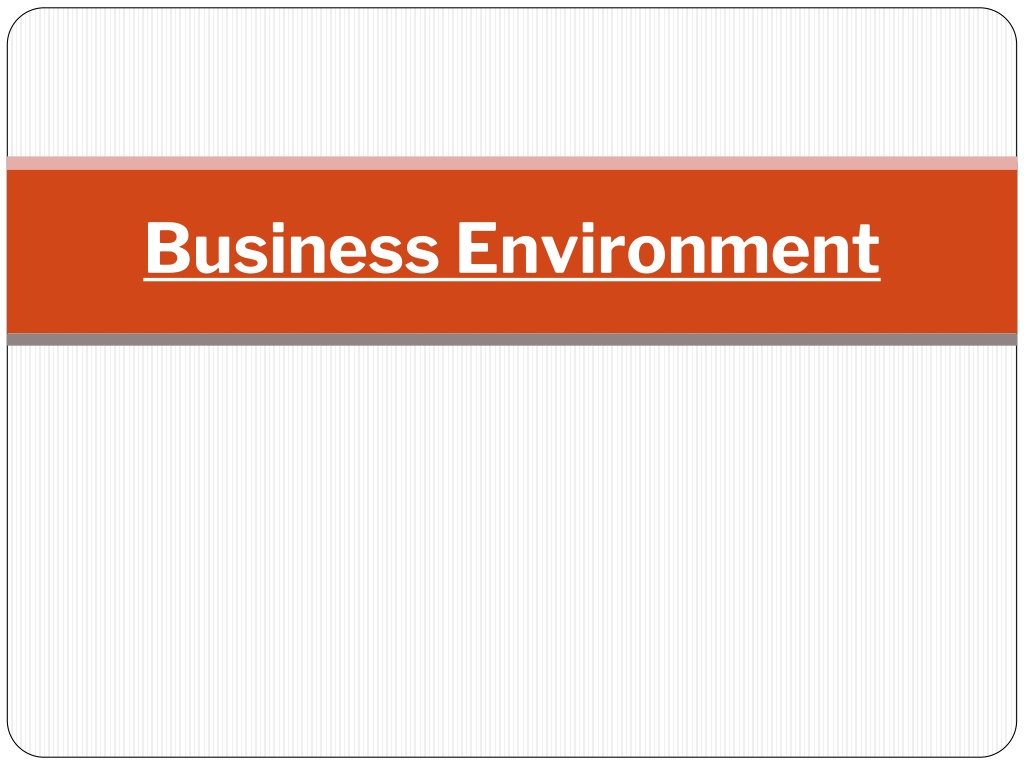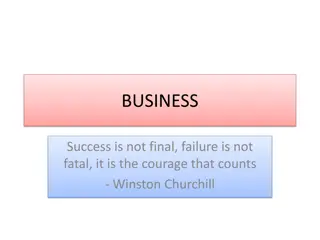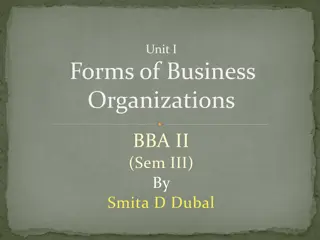Understanding Business Environment and Its Features
Business encompasses all activities involved in producing and distributing goods and services. It is a key source of revenue for the government, a provider of essential goods for consumers, and a profit-driven entity for individuals. The definition, features, and activities of business highlight its role in creating wealth, meeting societal needs, and managing risks. Business dealings involve the production and exchange of goods and services with a profit motive and a dynamic, creative nature. Services such as finance, transportation, and insurance are essential components of the business landscape. The creation of utility, continuity, and government control are key aspects that shape the business environment.
Uploaded on Dec 05, 2024 | 1 Views
Download Presentation

Please find below an Image/Link to download the presentation.
The content on the website is provided AS IS for your information and personal use only. It may not be sold, licensed, or shared on other websites without obtaining consent from the author. Download presentation by click this link. If you encounter any issues during the download, it is possible that the publisher has removed the file from their server.
E N D
Presentation Transcript
Business & its Environment Module: 1
Business Business is a generic term which comprises of all primary and ancillary activities which are involved in the production and distribution of goods and services. The term business has varied interpretations. For a consumer, business is supply of goods and services required for daily life. For the government , business is an important source of revenue. For environmentalist business is responsible for pollution. Basically all socially desired economic activities adopted to earn profit can be defined as Business .
Definition The activities of buying and selling goods, manufacturing goods or producing services in order to make profit. Business is an institution organised and operated to provide goods and services to society under the incentive of private gains. Business is a human activity directed towards producing or acquiring wealth thru buying and selling activities.
Features of Business Dealings in Goods and Services 1. 2. Production and/or Exchange 3. Creation of Form, Time and Place Utility 4. Regularity and Continuity in Dealings 5. Profit Motive 6. Risk and Uncertainty involved 7. Creative and Dynamic 8. Government Control
1. Dealings in Goods and Services Goods produced or exchanged, may be consumers' goods, such as bread, rice, cloth, etc. or producers' goods such as machines, tools, etc. The consumer goods are meant for direct consumption, either immediately, or after undergoing some processes,. The producers' goods are meant for being used for the purposes of further production. Producers goods are also known as capital goods. Services include supply of electricity, gas, water finance, insurance, transportation, warehousing, etc.
2. Production and/or Exchange Every business is concerned with production and exchange of goods and services for value (money). Thus, goods produced or purchased for personal consumption or for presenting to others as gifts do not constitute business, because there is no sale or transfer for value. For example, if a person cooks at home for personal consumption, it is not business activity. But, if he cooks for others in his 'dhaba', or restaurant and receives payment from them, it becomes his business.
3. Creation of form, time and place utility All business activities create utilities for the society. Form utility is created, when raw materials are converted into finished goods and services. Place utility is created, when goods are transported from the place of production to the place of consumption. Storage of goods creates Time utility, this helps in preserving the goods, when not required and making them available, when demanded by the consumers.
4. Regularity and Continuity in Dealings Regularity of economic transactions is the essence of business. There should be continuity, or regularity of exchange of goods and services for money. An isolated transaction cannot be called a business. For example, if a person sells his flat and earns some profits, it cannot be called a business. But, if he purchases and sells flats regularly to earn his livelihood, it will be called his business.
5. Profit Motive The chief objective of a business is to earn reasonable profits or 'surplus'. The survival of a business depends upon its ability to earn profits. Every businessman wants to earn profits, to get return on his capital and to reward himself for his services. Actually, profit is the spur that helps in the continuation of the business. Profit is also essential for growth. Recreation clubs and religious institutions cannot be called business enterprises, as they have nothing to do with the profit motive.
6. Risk and Uncertainty involved Business activities are always risky and uncertain. Every businessmen has to undertake substantial risks in his business. A business enterprise may suffer loss due to a number of possible reasons such as changes in technologies, changes in consumer tastes and preferences, market competitions etc.
7. Government Control Government has to keep a watch on overall business activities and see that they move in the right direction. For this , government control is a must. This may be in the form of suitable laws, rules, regulations, sanctions and so on.
8. Creative & Dynamic Business activities are creative as they are normally for the convenience of consumers. They are ever changing. This is natural as business operates under changing economic, social, and technological environment. Modern business is dynamic as it has to change and adjust its activities as per the environmental factors.
Need / Function of Business Regular supply of goods and services 1. 2. Optimum & meaningful use of resources 3. Creation of employment opportunities 4. Provision of revenue to the government 5. Social welfare 6. Facilities economics growth 7. Capital Formation
Types of Business Sole Trading Concern Partnership Firm Joint Stock Company Cooperative Society Joint Hindu Family Business
WHAT ARE BUSINESS OBJECTIVES? Every rational human activity needs well defined objectives. Business is no exception to this rule. Profit making, social recognition and business growth are some universally accepted Business objectives . Objectives indicate the destination towards which the business unit desires to move. Running a business unit without well defined objectives is like journey without fixed destination. On the other hand objectives means giving a definite and clear direction to the activities of the organisation.
Objectives are the ends which a business unit desires to achieve. They are future destinations of an organisation. They act as focal points before the business enterprise. Objectives are normally decided by the top management of the company. Lower level are too busy in routine business activities and do not have time to look after overall business objectives. Top management should review the objectives periodically and give proper direction to the whole organisation in this regards. Objectives are not stable over a long period. In fact they are redefined periodically as per the environmental changes.
Definitions of Business Objectives Objectives are the ends towards which activities of any enterprise or department or project within it are aimed. Objectives are the goals, aims or purpose that organisations wish to achieve over varying period of time. A specific result that an organisation aims to achieve within a time frame and with available resources.
Examples of Business Objectives Increase your product or service's market share Reduce employee turnover and increase satisfaction Maintain or increase profits Strengthen customer service Install tools and systems to increase productivity Improve company value Enhance the quality of a business's product or service Reduce Ongoing Business Expenses
Features/Characteristics of Business Objectives Lengthy Process Clear and easily understandable Concrete and Specific Challenging Time Frame Profitability Flexible Hierarchy of Objectives Qualitative and Quantitative 1. 2. 3. 4. 5. 6. 7. 8. 9.
Importance/Significance of Objectives in Business Management Objectives justify the existence : Every enterprise needs its own objectives. The objectives offer social justification for its existence. A business enterprise lacks moral right to operate if there is nothing to achieve. Facilitates planning process : Business objectives facilitates management process which includes planning, organising, staffing etc. Management which does not define its objectives would not know where it wants to go and will become a victim of confusion. Objectives facilitates planning process.
Define relationship with its environment : Objectives suggest what the organisation desires to achieve for its employees, customers and the society at large under the prevailing circumstances. Well defined objectives give convenience to the organisation and the outsiders also. Enable managers to work with confidence : Objectives guide and motivate managers and thereby enable them to manage business activities with confidence. Managers set the objectives for them and also for the organisation and see that they are achieved within the fixed time limit.
Facilitates correct Decision making : Objectives help to coordinate strategic decision making in the organisation. Decision making process becomes easy, quick and correct in the light of the objectives. Provides standard for performance appraisal : Objectives state the targets to be achieved within a specific time limit. They can be used by judging actual performance. Objectives provide clear cut basis for evaluating the performance of an organisation.
Brings uniformity in the activities of departments : Objectives act as connecting link and bring integration in the activities of different departments such as production, sales, finance etc. Broad objectives are divided into smaller parts and made applicable to different departments. This ensures coordination and uniformity in the working of different departments.
Organic/ Threefold /Basic Objectives of Business
Organic/ Threefold /Basic Objectives of Business A business unit has to give attention to 3 basic objectives. 1. Survival 2. Growth 3. Recognition/image
Survival Survival in the business is the basic objective of a business unit. It is classified as organic/primary objective of business. Survival comes first and profit comes next. Other objectives can be thought of only if the business unit stands independently in the market. No company can take its survival for granted in the present complex and highly competitive business environment. Constant monitoring of the business situation and strategic planning are necessary for survival in the competitive business environment. For survival, full utilization of available resources, adjustment with the environmental forces, enhancing competitive capacity and securing support of various social groups are necessary. Profit And Survival are supplementary, as survival in business is just not possible without earning profits.
Growth Growth is the second major business objective. It is next to survival as a business unit can go for expansion only when it gets adequate stability. Growth means expansion of business activities by introducing new products, new plants, expansion of marketing activities, diversification in new areas, foreign collaboration, takeovers etc. A business unit can have expansion only when its survival base is sound. Survival is essential for growth. Expansion and growth bring more profit, more business and popularity to a business unit. Long term planning is necessary for orderly and multi dimensional growth of an enterprise.
Recognition /Image/ Prestige A business unit desires to have social recognition i.e. market reputation. This objective can be described as favourable image building of the enterprise among consumers and other social groups. After securing stable survival and growth an enterprise will like to give attention to image building and market standing. This can be done by sponsoring sports, cultural activities, educational project and so on. The basic purpose is to have a good public image. The enteprise feels that others should have confidence on the company and treat it as an honest and consumer friendly company. Prestige generally comes due to standard quality of its products, regularity in their supply, reasonable prices and satisfactory service to consumers. Recognition indicates public confidence on an enterprise. Such recognition is only possible after a long period of useful service to the society.
Steps in formulating Business Objectives
1. Consider Environmental Factors 2. Consider resources of the enterprises 3. Consider individual dominance 4. Consider value system 5. Consider past objectives 6. Determine final objectives
Environment The word Environment is derived from the French word Environ which means surrounding . Environment means the surrounding within which someone or something exists. It is like the climate or culture which surrounds us. Man and his environment are closely connected and related.
Business Environment A business organisation does not exist in a vacuum. It is in fact dependent on the environment. For efficient and rational decision making a business organisation must understand its relationship with its environment. Business has to operate within the situation created by the environmental factors/forces. It has to adjust its activities as per the environmental changes. Such adjustability is essential for survival and growth of business.
A business firm is an open system and it affects and is affected by outside events and factors which make up the external environment. Business environment may offer opportunities for the firm or threats to the firm. A business firm is also affected by a number of internal factors, which are forces inside the business organisation. While the policy makers and the managers at the top level are concerned with the external environment, the middle level and lower level management are more concerned with the internal environment.
Definition The combination of internal and external factors that influence a company's operating situation. The total of all things external to firms and individuals, which affect their organisation and operations. The aggregate of all conditions, events and influences that surround and affect it.
Features of Business Environment Environment is the surrounding situation of business Environment is dynamic Business to a greater extent can not control the environment Business can not directly change the external environment Direct and lasting effect Environment is inseparable part of business Business environment is complex Environment creates opportunities and challenges
Components / Types/ Areas of Business Environment
Internal Environment Value system Mission and Objectives Corporate Image R and D Facility Human Resources Organisations physical and financial resources
External Environment Micro Environment Macro Environment
External Environment PESTLE ANALYSIS P - Political Environment E Economic Environment S - Socio Cultural Environment T - Technological Environment L - Legal Environment E - Ecological Environment PESTLE Analysis was created by Harvard Professor, Francis Aguilar in 1967.
1. Political Environment This includes the political system, the government policies and attitude towards the business community and the unionism. All these aspects have a bearing on the strategies adopted by the business firms. The stability of the government also influences business and related activities to a great extent. It sends a signal of strength, confidence to various interest groups and investors. Further, ideology of the political party also influences the business organisation and its operations
Elections, assurances given by political parties, donations to political parties, political developments like death of an important political leader, political scandals, corruption charges on leading political parties, war etc are major political factors which affect the political environment. The success & growth of business depends upon stable, dynamic, honest, people oriented government, proper law and order situation, strong party in power, responsible opposition and responsible role of press and publicity. Political friendship & diplomatic relations help in growth of trade.
Countries with stable government and political system have enjoyed successful and efficient business operations. USA is the best example. Business and Politics is inseparable. In fact business can not remain unaffected by Politics. Business and Politics are inseparable. Business cannot remain unaffected by politics.
Features Influencing factors Favorable or Unfavorable Sensitive and flexible Closely related to Economic environment Importance of stable Political environment
2. Economic Environment Economic conditions, economic policies and economic system are the factors that constitute the economic environment. It is multi dimensional in nature & includes all factors connected with the working of the economic system. Economic environment includes investment trends, inflation, monetary policy, fiscal policy, budgetary policies, business laws, industrial licensing, foreign exchange policies, Exim policy, labour policies, balance of trade, balance of payment, economic planning, commercial policies etc. Economic environment is basically the net result of economic policies of the government.
Businessmen have to study the prevailing economic environment and adjust their business plans accordingly. Favourable business environment bring rapid expansion of business activities including marketing, manufacturing, exporting and so on. Economic Environment is supplementary to political environment and is influenced by political decision and political events.























